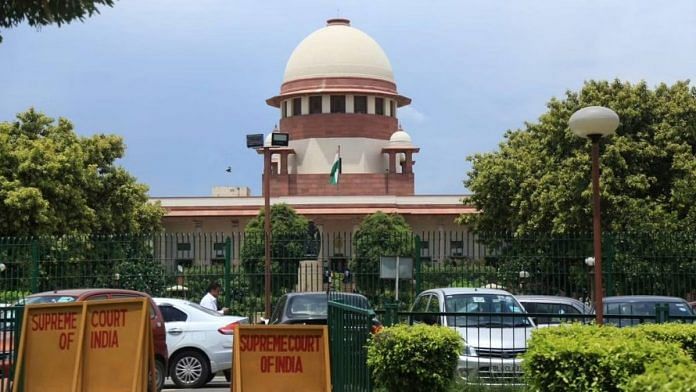New Delhi: The Supreme Court Tuesday expressed doubts over the law laid down in its 2016 decision in the Nabam Rebia case, which held that the Speaker of an Assembly cannot initiate disqualification proceedings when his/her own position is under challenge.
A three-judge bench led by Chief Justice N. V. Ramana observed that it was important to settle the issue with regard to the powers of a Speaker or a Deputy Speaker when he/she is facing a no-confidence plea.
The court made this noting while it referred the dispute between Uddhav Thackeray and Eknath Shinde factions of the Shiv Sena to a constitution bench.
“The proposition of law laid down by the constitutional bench in Nabam Rebia stands on contradictory reasons, which requires gap filling to uphold the constitutional morality. As such, the question is referred to a constitution bench for the requisite gap filling exercise to be conducted,” the bench said.
The constitution bench will hear the case on 25 August.
It will first consider the interim relief sought by the Thackeray group to stay the proceedings before the Election Commission, which is considering Shinde faction’s request to recognise it as the official Shiv Sena, the CJI’s bench said, while dictating its order.
Till then, the top court said, the poll panel would not take any action on Shinde’s plea.
Also Read: Shinde govt scores big win in Maharashtra assembly as BJP MLA Rahul Narvekar is elected Speaker
Five petitions to be heard
With Tuesday’s order, five petitions related to the political crisis in Maharashtra would be heard by the Constitution Bench. One of the petitions includes that of Shinde and 15 other rebel MLAs who challenged the disqualification notices issued to them by the then Deputy Speaker.
It was on these petitions that the bench of Justices Surya Kant and J. B. Pardiwala on 27 June extended time given to the rebel MLAs to file written responses. After this order, Thackeray had resigned and Shinde took over the reins of the new government with support from the Bharatiya Janata Party (BJP) in Maharashtra.
Then there are two petitions filed by Shiv Sena MP Sunil Prabhu, who was the party’s chief whip during the Thackeray rule. While the first challenges the governor’s direction to the chief minister to prove majority of the Maha Vikas Aghadi government, the other questions the action of the newly elected Speaker to recognise the Shinde group’s nominee as the Sena chief whip.
The fourth petition was preferred by Shiv Sena general secretary Subhash Desai, assailing the Maharashtra governor’s decision to invite Shinde to be the new chief minister.
On Tuesday, the Supreme Court framed 11 substantial questions of law for the constitution bench’s consideration.The first question deals with the Speaker’s power in a scenario when a notice of removal is moved against him/her. The second raises the issue of whether the Constitution invites a decision on disqualification proceedings by the high courts or the Supreme Court.
“Can a court hold that a member is deemed to be disqualified by virtue of his/her actions absent a decision by the Speaker,” read the third question. The fourth dwells on the status of proceedings in the House during the pendency of disqualification petitions against members.
The questions also seek more clarity on the status of proceedings that took place during the pendency of disqualification petition against an legislator in case the Speaker holds that the lawmaker is disqualified from the date when the petition was moved.
The Constitution Bench will also decide on the scope of the Speaker’s power to determine the whip and leader of house of the legislative party and also the interplay with respect to the Tenth Schedule which talks about the anti-defection law.
Further, the larger bench will also look into the scope of judicial review in intra-party questions — in the governor’s decision to invite a person to form the government and the Election Commission’s powers with respect to deter ex-parte split within a party.
(Edited by Tony Rai)
Also Read: Moral, political & ideological questions on Maharashtra: 1st is simplest to answer, 3rd trickiest



